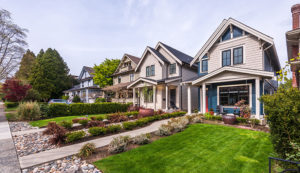Florida HB403: Can HOAs Stop You From Working From Home Or Setting Up Shop?

The introduction of Florida HB403 has given homeowners more freedom when it comes to working from home. But, the bill has also resulted in concerns among citizens and homeowners alike.
Browse By Category
Sign up for Our Newsletter
The introduction of Florida HB403 has given homeowners more freedom when it comes to working from home. But, the bill has also resulted in concerns among citizens and homeowners alike.
What Is Florida HB403?
Florida House Bill 403 was first filed in January 2021. After months of back and forth, Gov. Ron DeSantis signed the bill in June 2021 and it finally passed into law in July 2021.
Among other things, the bill allows home-based businesses to operate even in areas zoned for residential use. It does away with rules that limit an owner from running a business from their home, such as how much square footage they can use, what products and services they can sell, and how many family members can work for the business.
According to Rep. Mike Giallombardo, the sponsor of the bill, HB403 serves as a way “to keep Florida at the forefront of freedom.” It would essentially display that the Sunshine State is open for all types of business, even home-based ones.
New Florida HB 403 Raises Concerns Among Cities
 While operating a home-based business in Florida isn’t a problem in and of itself, the bill does introduce a few key issues. Homeowners associations, in particular, are worried that the bill might alter the character of their communities. Residents have also started to raise concerns about safety and security.
While operating a home-based business in Florida isn’t a problem in and of itself, the bill does introduce a few key issues. Homeowners associations, in particular, are worried that the bill might alter the character of their communities. Residents have also started to raise concerns about safety and security.
In Tallahassee, a concern they received from citizens was the establishment of brothels or gentleman’s clubs in single-family neighborhoods. The bill’s kicker is that it currently does not restrict the kinds of businesses owners can put up. If the business follows the law and secures the proper permits, cities are essentially backed into a corner and forced to let them operate.
Another concern homeowners have is that some people might set up gun or ammunition shops in their neighborhoods.
Real-Life Example
An ammunition shop is exactly what one owner planned to open in the city of Lauderdale Lakes.
Jameson Labady has always wanted to expand his business. While his current business, JSL Security Intelligence, provides private security, he wishes to open a new venture selling ammo. The new business would carry the name, Popping Smoke Ammunition, and would operate from his two-bedroom home.
When Labady filed the paperwork for his new business, officials sprang to action. Lauderdale Lakes Mayor Hazelle Rogers reached out to Tallahassee lawmakers for help, worried about the safety of residents.
Although Labady doesn’t intend to store the ammo in his house, he has since backed down after his HOA reacted negatively to the idea. He ultimately decided not to fight his association on the matter. Instead, Labady plans to look for a commercial space to house his new venture.
Homeowners Associations and Rules on Commercial Use
It is not uncommon for homeowners associations to have certain bans or restrictions on using a residential property for commercial purposes. In fact, many associations outright prohibit residents from operating a business from their homes. This is because it creates safety and security issues.
A private subdivision may not want outside customers going in and out of the community. Having strangers inside a gated HOA might make residents feel unsafe. It’s also impossible to screen all of them before they enter the neighborhood.
Operating a business also involves the possibility of several vehicles parked along the street. If a street is blocked by too many vehicles, emergency responders won’t have a way to get through.
Finally, businesses need signs and all sorts of paraphernalia. The sign alone can go against the association’s architectural standards. Flyers, posters, and business cards may also litter the neighborhood. Beyond that, ad-painted vehicles are also an eyesore to the community.
How the Bill Affects HOAs and Condos
 Homeowners associations are understandably concerned about the aftermath of the bill passing into law. But, it is worth noting that the bill does not supersede any current or future declaration of an HOA or condominium pursuant to Chapter 718, Chapter 719, or Chapter 720.
Homeowners associations are understandably concerned about the aftermath of the bill passing into law. But, it is worth noting that the bill does not supersede any current or future declaration of an HOA or condominium pursuant to Chapter 718, Chapter 719, or Chapter 720.
This means that if an association’s declaration prohibits homes used for commercial use, the HOA can uphold the restriction. The new law, though, does not address an association’s rules and regulations.
As such, if an HOA does not have language built into its declaration prohibiting home-based businesses, it likely can’t stop owners if they have the proper licenses and permits. This poses a problem for neighborhoods that don’t belong in associations, too, as they don’t have the same restrictions that an HOA would normally have.
Florida HB403 Likely to Undergo Tweaks
It is currently unknown how many home-based businesses have sprouted since the passing of Florida HB403. But, it is clear that the new bill certainly has its downsides.
Rep. Michael Gottlieb, the chair of the local delegation of Broward senators and representatives, believes there is work left to be done. Gottlieb has said that lawmakers still need to refine the legislation.
Broward Rep. Chip LaMarca also said that the bill may undergo some changes pertaining to the industries that it will allow to operate in a residential area.
Florida HB403 was crafted with the intention of protecting professionals from being penalized for using their living room as a workspace. During the COVID-19 pandemic, working from home had become necessary. But, lawmakers likely did not expect it to spark such a huge response from local governments.
Seeking Legal Advice
Legislators passed Florida HB403 with the aim of encouraging small businesses and aiding the American dream. However, it also spawned unintentional consequences and understandable concerns. For now, local governments and homeowners associations should simply keep an eye out for any new developments.
HOAManagement.com strives to provide up-to-date law news. Look for the best lawyers, vendors, and HOA management companies in your area using our online directory!
Disclaimer: We do not offer or provide legal advice. If you need legal help, it is best to consult an attorney.
RELATED ARTICLES:
- New Florida Condo Safety Law Spells Big Changes For Condo Associations
- Colorado New HOA Laws: How Will This Impact HOAs?
- How Can The HOA Board Apply The Alternative Dispute Resolution Approach?
Trending Now
Related Article
Sign up for Our Monthly Newsletter
Sign up below for monthly updates on all HOA Resource

















